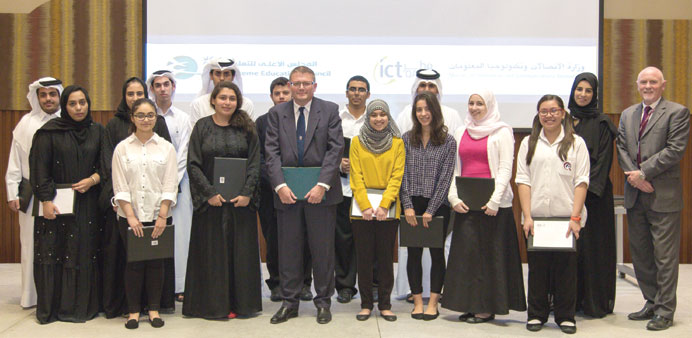By Joey Aguilar/Staff Reporter
The Ministry of Information and Communications Technology (ictQATAR) yesterday launched a national initiative encouraging youth to teach the elderly on how to use modern technology.
Reem al-Mansoori, Assistant Undersecretary of Digital Society Development, ictQATAR, said Wasla (which means ‘link’ in Arabic) aims to help the elderly have better access to technology with the help of their children, grandchildren and younger relatives.
She noted that Wasla Intergenerational ICT Learning Programme will help develop and enhance the digital skills of older persons to bridge “the digital generation gap”.
“The initiative will enable all components of society to integrate the elderly into the digital world and to forge positive co-ordination between members of the same family through volunteer work that will be led by high school students as pioneers of digital inclusion,” stressed al-Mansoori in her speech.
She added that Wasla will also contribute in further strengthening family relationships in the country.
During the presentation, ictQATAR noted that the biggest obstacle for the elderly in Qatar is their lack of digital skills.
Of the 45,000 people in Qatar aged over 40, the ministry hopes to target at least one third with the help of secondary students who have the digital knowledge and skills.
The ministry wants to ensure that all members of the society have the ability to access technologies.
By providing better understanding about ICT, al-Mansoori believes that Wasla will reduce isolation of older people in the digital society and create a lifelong learning mindset.
“Wasla is a part of ictQATAR’s plans to cultivate digital literacy for all people in Qatar in alignment with government steps toward building a knowledge-based society as detailed in the Qatar National Vision 2030,” al-Mansoori explained.
The ministry had identified 43 students and 47 older relatives in its pilot project which was launched in February and ended last month. It was completed at three educational institutions: Qatar Academy, Newton International School and Al Maha Academy.
Maha Khodadad , project manager of Digital Inclusion of Digital Society Department, ictQATAR said they plan to continue the programme for three years with the help of independent and international schools in the country. SEC confirmed that 10 of its schools will join the programme.
“We want Wasla to have a programme of its own to make it sustainable,” she added.
The initiative will also involve collaboration of various government agencies, schools, organisations and other groups of varying ICT skills, according to ictQATAR as it cited the important role of schools and youth organisations in the success of the programme.
“Literacy no longer means being able to only read and write if you are still digitally illiterate. Digital literacy has become an end goal for nations that seek to build modern, knowledge-based societies. They do so by increasing their populations’ ICT knowledge and skills,” said Fawzia al-Khater, director of Supreme Education Council (SEC) Education Institute.
The Ministry’s Digital Inclusion team had developed Wasla training resources and tools and made it available for use by any newly joining entity.

ictQATAR honors some of the Wasla Pilot Project participants.
